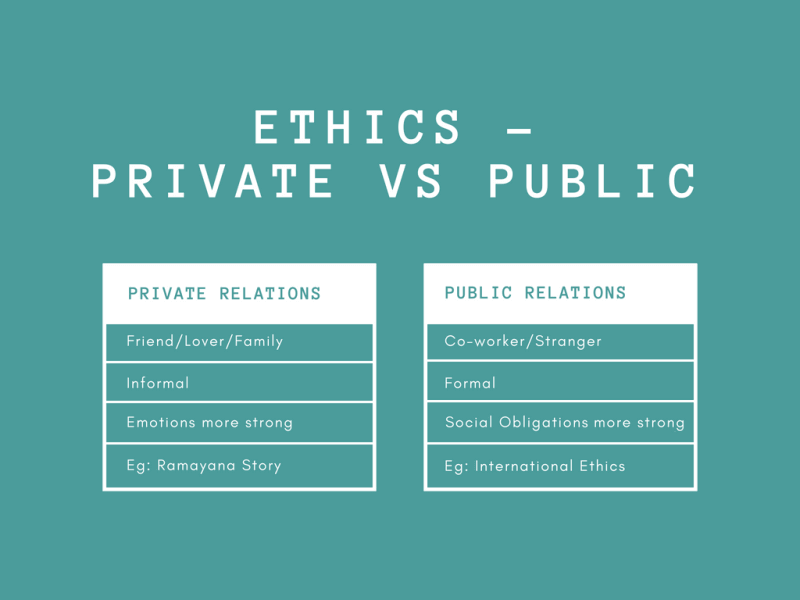Ethics – Definition and Concept
Ethics – Definition and Concept
Definition and Concept
Ethics is the study of what is right or wrong in human conduct. This is a branch of Philosophy which studies moral principles. Hence, Ethics is also known as Moral Philosophy.
ETHICS VS MORAL
S Many people use the words Ethics and Morality interchangeably. However, there is a difference between Ethics and Morals.To put it in simple terms, Ethics = Morals + Reasoning.To have an ethical viewpoint, you should be able to give some reason for it. Yes, Ethics is Moral Philosophy, and Philosophy is all about reasoning
Many people use the words Ethics and Morality interchangeably. However, there is a difference between Ethics and Morals.To put it in simple terms, Ethics = Morals + Reasoning.To have an ethical viewpoint, you should be able to give some reason for it. Yes, Ethics is Moral Philosophy, and Philosophy is all about reasoning
For example, you might feel that it is morally wrong to steal, but if you have an ethical viewpoint on it, it should be based on some sets of arguments and analysis about why it would be wrong to steal.To be moral is all about adhering to what is described (by society or religion). But to be ethical, you should figure out what is right – by applying some principles and considering all the complexities involved. Clearly, the ethical life is the harder path.
ETHICS AND MORALS – AN ANALOGY WITH A CAR DRIVER AND AN AUTOMOBILE ENGINEERLet’s take the case of a car driver and an automobile engineer. The car driver knows how to drive a car, but he may not know the engine mechanism or design principles. However an automobile engineer is concerned with how the car works, and the principles involved.Connecting the above example with ethics and morals, you can see that following morals is just like driving the car without understanding the working principles of the engine. But if you follow ethical principles – you would be using reasoning and analysis (just like the automobile engineer in the above example) to understand the situation/case better. If the engine starts to create trouble, the engineer may be able to use the problem-solving approach as well.
ETHICS AND HUMAN INTERFACE – TOPICS COVERED:
- Essence, determinants and consequences of Ethics in human actions
- Ethics in private and public relationships
ESSENCE, DETERMINANTS AND CONSEQUENCES OF ETHICS IN HUMAN ACTIONSEthics is all about reasoning about how one should act in a given circumstance – ie. how to do the right action.
ESSENCE OF ETHICSEthics is the study of morality. The essence of Ethics (core of ethics) is to understand those philosophies which guide us in determining what is right or wrong
DETERMINANTS OF ETHICSDeterminants are the sources from which the ethical standard arises. There are multiple determinants of ethics like
CONSEQUENCES OF ETHICSA consequence is the outcome of any act. Doing good with proper reasoning (being ethical) has many positive consequences like
- Safeguarding the society.
- Satisfying basic human needs etc.
However, being unethical has many negative consequences like
DIMENSIONS OF ETHICSEthics is not just a theoretical science, it has a lot of applications in day to day life. Being multi-dimensional in nature, ethics is divided into four main branches. They are:
- Meta-Ethics (Ethics about Ethics)
- Prescriptive Ethics (Normative Ethics)
- Descriptive Ethics (Comparative Ethics)
- Applied Ethics.
We will see the different branches of ethics in detail, in the next post – Dimensions of Ethics.ETHICS IN PRIVATE AND PUBLIC RELATIONSHIPS Individuals should be ethical in both private and public relationships. In doing so, they should also try to achieve a right balance between private an public ethics.
Individuals should be ethical in both private and public relationships. In doing so, they should also try to achieve a right balance between private an public ethics.
ETHICS IN PRIVATE RELATIONSHIPSPrivate relationships largely involve relations with family and friends and hence are informal in nature. Private relationships are often driven by emotions and not by reasoning. This can result in unethical practices.For example, helping your friend to cheat in an exam (unethical). Also, remember the Ramayana story where Kaikeyi tried to put her son Bharata on the throne, ahead of Rama – the elder son of Dasharatha (unethical).
ETHICS IN PUBLIC RELATIONSHIPSPublic relationships involve relations which are formal in nature. This can include co-workers, government officials, or strangers. There can be legal or social obligations as well.Ethics in public relations can come into play at:
- Social Ethics – tolerance towards other sections, peace and harmony etc.
- Political Ethics – constitutional ethics, national interest etc.
- Organisational Ethics – impartiality, honesty, hard work, efficiency, corporate governance etc.
- International Ethics – ethics in diplomacy, respecting international treaties etc.
Many people use the words Ethics and Morality interchangeably. However, there is a difference between Ethics and Morals.To put it in simple terms, Ethics = Morals + Reasoning.To have an ethical viewpoint, you should be able to give some reason for it. Yes, Ethics is Moral Philosophy, and Philosophy is all about reasoning
Individuals should be ethical in both private and public relationships. In doing so, they should also try to achieve a right balance between private an public ethics.

No comments:
Post a Comment